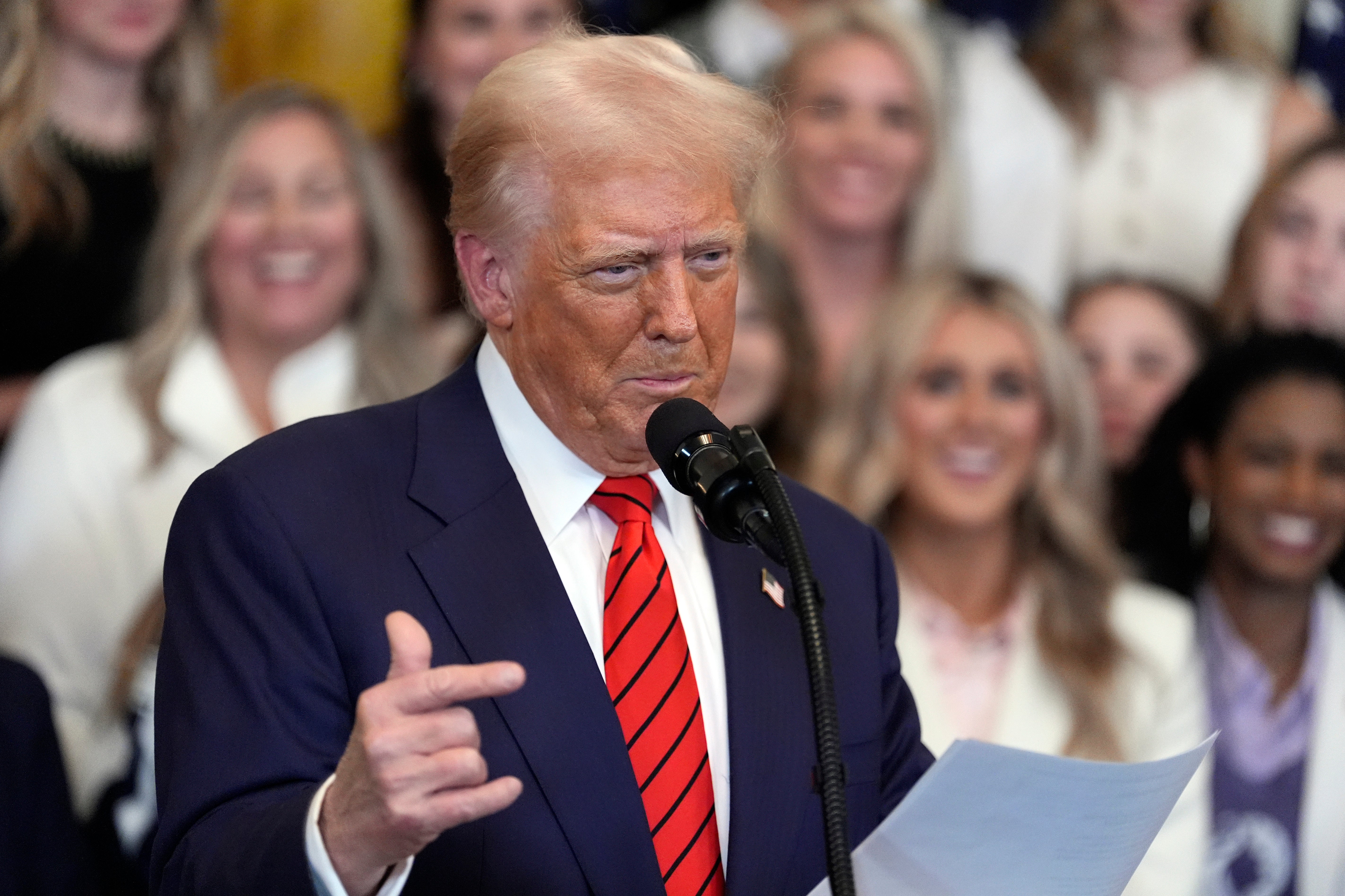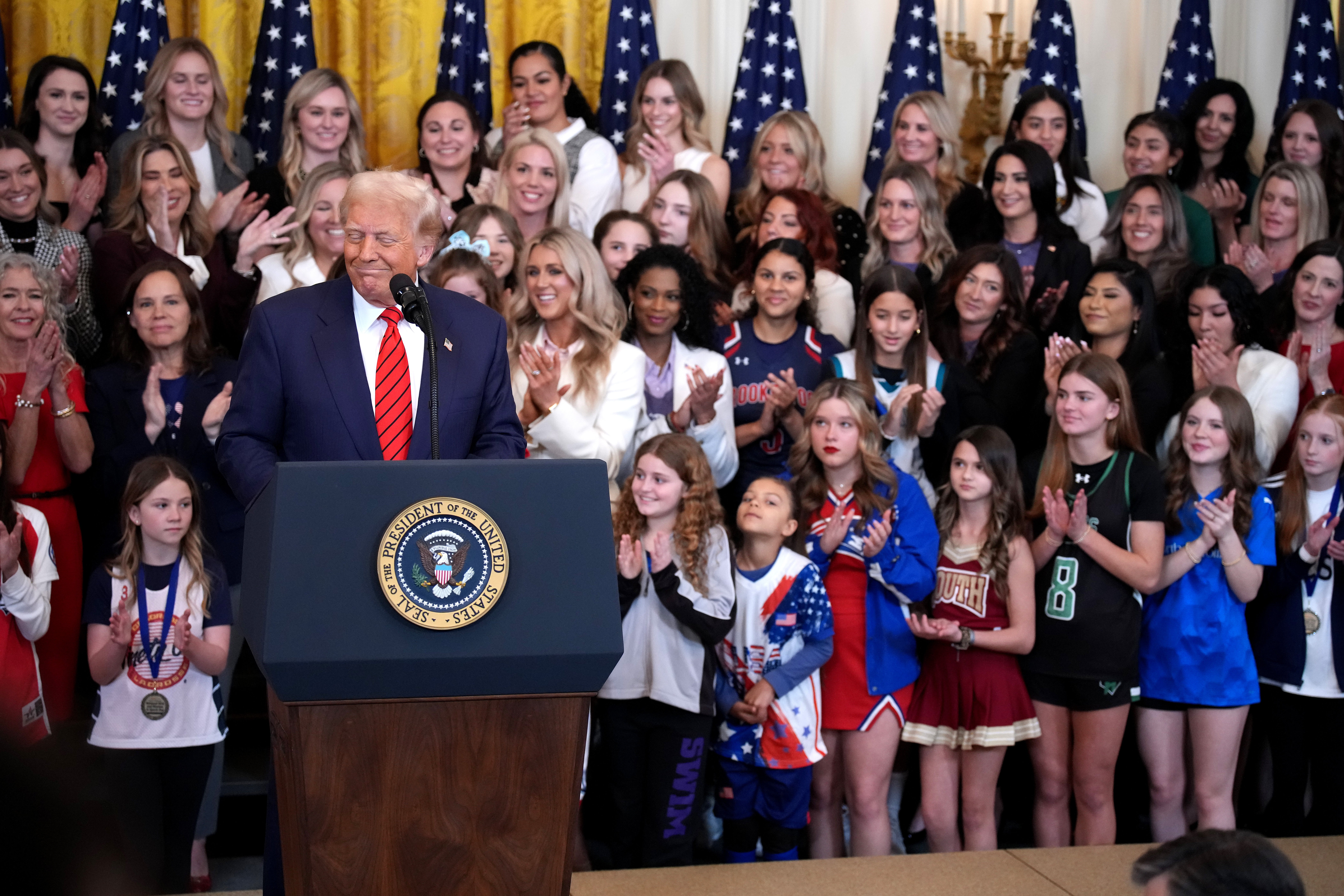Donald Trump has signed a sweeping executive order to force schools and athletic organizations to ban transgender girls and women from competing in women’s sports.
The order — which falsely categorizes trans women as “men” — fulfills the president’s campaign promise to end “the dangerous and unfair participation of men in women’s sports” by directing federal law enforcement agencies to take “immediate action” against schools and associations that “deny women single-sex sports and single-sex locker rooms,” according to a White House document shared with The Independent.
In remarks from the White House on Wednesday while surrounded by young girls, Trump claimed that the “radical left” has “waged an all-out campaign to erase the very concept of biological sex and replace it with a militant transgender ideology.”

“If you let men take over women’s sports teams or invade your locker rooms, you will be investigated for violations of Title IX and risk your federal funding,” he said.
Trump is also ordering state attorneys general to “identify best practices for ensuring equal opportunities for women in sports and to highlight impact stories of women harmed by male athletes competing in women’s sports,” according to the White House.
Secretary of State Marco Rubio is also ordered to direct the International Olympic Committee to “preserve single-sex sports, a necessity for safety and fairness,” the document states.
Trump also is directing Homeland Security Secretary Kristi Noem to “reject any and all visa applications made by men attempting to fraudulently enter the United States while identifying as women athletes, trying to get into the games, maybe,” Trump said Wednesday.
Transgender athletes who “beat and batter female athletes” is “going to end, it’s ending right now, and no one’s going to do a damn thing about it,” he said.
Trump’s order — which follows Republican-led virtue signaling, lawsuits and legislation that have dominated state legislatures and campaigns over the last several years — joins the administration’s broader efforts to erase federal protections and recognition of transgender people.
LGBT+ civil rights groups have blasted Republican-led attacks as a manufactured “non issue” affecting only a handful of vulnerable Americans, all in an effort to whip up votes while unleashing a wave of discriminatory attacks against trans Americans.
An executive order issued on his first day in office requires federal agencies to recognize gender as an “immutable” male-female binary determined by biological sex, assigned at conception, that cannot be changed.
On Wednesday, Trump called the order an attempt to “reclaim our culture and our laws” from trans people.
Among other changes across the whole of government, Trump’s Day One order also calls for the replacement of all mentions of “gender” with “sex,” ends gender self-identification on federal documents such as passports, and commands agencies to ignore the Supreme Court’s 2020 ruling that protects against discrimination on the basis of sexuality or gender identity.
His latest executive order directs how his administration will interpret Title IX, the landmark civil rights law designed to prevent schools that receive federal funding from discriminating against women and girls, as well as survivors of sexual assault and pregnant students.
Joe Biden’s administration sought to implement rule changes that extend discrimination protections based on gender identity or sexual orientation, which the administration later abandoned and a federal judge blocked from taking effect.

The Human Rights Campaign, the nation’s largest LGBT+ civil rights group, says officials and activists have “manufactured a misinformed conversation about elite, adult athletes to justify passing extreme, discriminatory legislation targeting transgender youth in schools.”
During a Senate hearing last year, NCAA President Charlie Baker said that there were fewer than 10 transgender athletes currently participating in college sports.
There are roughly 300,000 young people ages 13 to 17 in the United States who identify as transgender, or fewer than 2 percent of all Americans in that age group, according to the Williams Institute at UCLA Law. There are fewer than 400,000 Americans ages 18-24 who identify as trans, the institute found.
Utah Governor Spencer Cox even noted in his veto of legislation designed to prevent trans students from competing in school sports that only four trans students participate in high school sports in the state, and only one transgender student participates in women’s sports.
“We all want sports to be fair, students to be safe, and young people to have the opportunity to participate alongside their peers,” Human Rights Campaign president Kelley Robinson said in a statement.
“But an attempted blanket ban deprives kids of those things,” she added.
Trump’s order “could expose young people to harassment and discrimination, emboldening people to question the gender of kids who don’t fit a narrow view of how they’re supposed to dress or look,” Robinson said.
Last year, House Republicans passed “The Protection of Women and Girls in Sports Act” to ban schools that receive federal funding from allowing trans girls and women to compete in sports designated for “women or girls.” Republican state lawmakers across the country have introduced dozens of similar bills to ban transgender athletes from playing in school sports that align with their gender.
Trump’s latest order is expected to face legal challenges; his administration is already facing lawsuits from transgender U.S. military service members, incarcerated transgender women, and transgender teenagers and their families following executive actions targeting transgender Americans.
In 2023, the Supreme Court voted 7-2 to allow a 12-year-old transgender girl in West Virginia to continue playing in school sports that align with her gender, marking the first time that the nation’s high court weighed into the nationwide legislative campaign to prevent trans youth from joining school sports.
The justices rejected the state’s attempt to enforce its ban and prevent the student from playing on her middle school’s track and field team.



